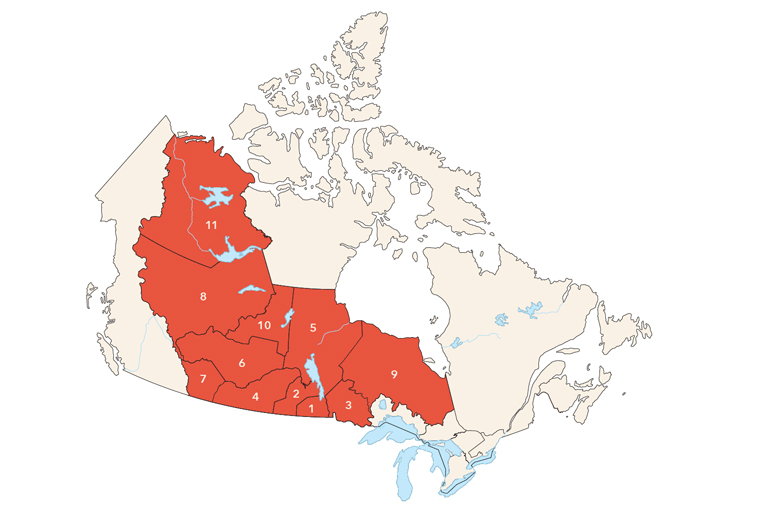A Collage of Canada: Harmonizing Many Voices
Grade Levels: 9/10, 11/12
Subject Area: Social Studies, History, Civics
Lesson Overview
Canada has a rich and varied past that can often lie buried in the archives. Too often, the histories of Canada focus on political and military exploits and the lives of the rich or powerful figures. But there are many other stories of Canada’s past to be told. Tales of the struggles and triumphs of Canadian labour, the journey to a new home of people from a multitude of former lands, and the trials and tribulations of growing up in Canada. It has often been said that a picture is worth a thousand words. Just imagine the volumes of history we can uncover through the paintings, symbols, and photographs held by Canadian museums, archives and especially, families.
Time Required
Three 60 minute class periods
Historical Thinking Concept(s)
This lesson plan uses the following historical thinking concepts: establish historical significance, use primary source evidence, identify continuity and change, and analyze cause and consequence.
Learning Outcomes
Student will:
- Develop cooperative group work skills
- Enhance their creative skills
- Expand their research and analytical skills
- Deploy critical thinking skills
- Promote a sense of Canadian citizenship and identity
- Create a proper bibliography in an academically recognized format
- Reflect and write critically about their work, experience, and skills developed during the project
Background Information
Canada is a multicultural country with people from diverse ethnocultural backgrounds who have moved here from all parts of the world. The modern Canadian identity is a conglomerate of diverse customs, traditions and beliefs yet Canadians have a shared sense of common identity and pride in our country that has been fostered by principles that we commonly uphold and cherish. Our diversity and harmony and the way we cherish and respect each other’s values are traits that are admired and respected globally.
The Lesson Activity
Activating:
- Students will be asked to research sources for information about the migration history of the ethnocultural group that they individually belong to and create a brief list of historical push and pull factors that have impacted the migration history of this particular group to Canada (e.g. why did people from Italy migrate to Canada).
- Students will go to the Government of Canada Justice Laws Website and explore the Multiculturalism Act and identify three reasons how this Act may have impacted the demographic composition of Canada today.
Acquiring:
Working in groups, students will create a collage of photographs, symbols, paintings, songs and/or poetry to visually tell the story of a group of Canadians during the past century. The completed collage will consist of 20 images (the equivalent of 20,000 words) that will be creatively placed in an appropriate location in the classroom.
The initial task will foster creativity and cooperative group skills, and introduce students to research and analytical skills. Although students will work cooperatively to complete the project, there will be parts of the assignment that must be completed individually. The collages can focus on any one of the themes listed above, but only one group per topic.
To complete this task, each student must:
- Prepare a bibliography of five to seven sources using the proper format—the bibliography must include at least three primary sources
- Prepare a list of five paintings, symbols, poems, songs of photographs to use in the collage
- Provide a one-paragraph (75 to 100 words) explanation why each of the pieces was chosen to reflect the theme of the collage
- Write a 250-300 word personal reflection which assesses the overall success of the project including the success of the group dynamics, the effectiveness of the collage in expressing the theme, and the overall learning experience
To complete this task, each group must:
- Collectively decide on the focus of the collage
- Share with each other the selections made by individuals to ensure no duplication
- Prepare a sketch/blueprint of the final design with a half to one-page detailed description (including shape, arrangement, colour) which will clearly explain how the collage will appear and how it will capture their theme as it relates to Canada in the twentieth and twenty-first century
- Gather, organize and assemble the hanging collage in the classroom
Applying:
All of the images can be individually printed and assembled into a collage or can be incorporated into a single slide using Powerpoint or similar software (the slide size can be modified to accommodated all selected images) and then printed. Final collages are to be laminated so that they can be creatively displayed in appropriate locations in the classroom.
Materials/Resources
- Internet access
- Printing materials
- Government of Canada Justice Laws Website
Extension Activity
Students can hold a Canadian identity and diversity fair where they can invite other students or stakeholders such as teachers and parents to view the collages. Each group can explain their collages to visitors. Alternatively, a virtual fair can be set up using a blog or website with visuals of the collages, themes, and explanations with a comments section for guests to leave their impressions and opinions about the fair.
Themes associated with this article
Advertisement




